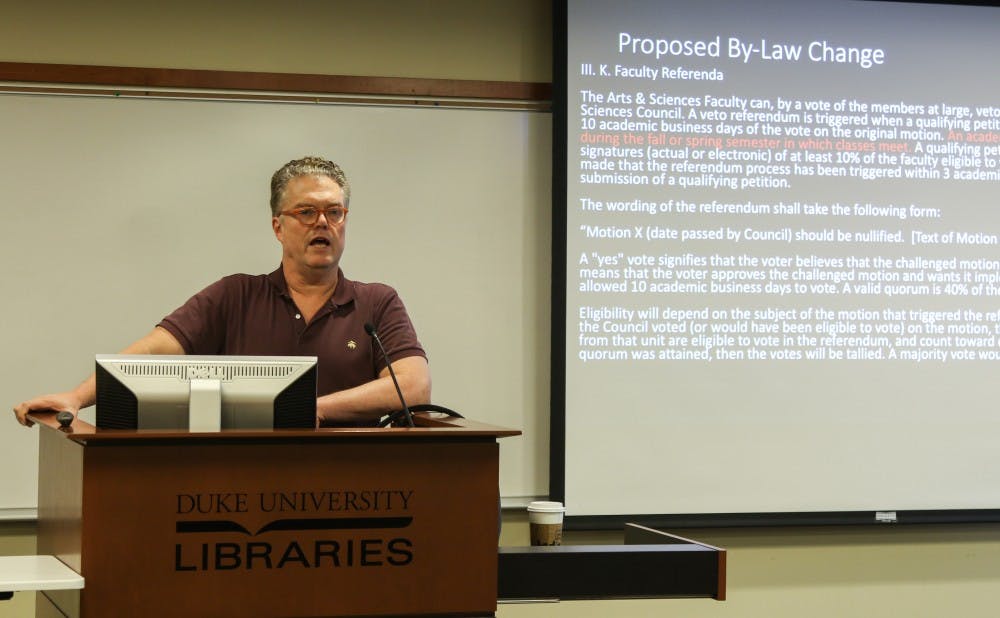The Arts and Sciences Council has voted down a rules change that would give the faculty at-large a chance to undo unpopular council decisions.
At Thursday’s meeting, the council voted against the creation of a veto referendum and also strongly voted in support of a resolution to not be an impediment to Trinity students who want to pursue Pratt certificates.
“Rules about rules take the highest scrutiny,” said Michael Munger, professor of political science and the council’s parliamentarian. “And this is rules about rules.”
As the bylaw stands, the faculty at-large do not have a matter of recourse if the senate-style faculty governance body passes a piece of controversial legislation it does not like.
The necessity of a veto referendum, Munger said, has never been shown.
“There hasn’t been one [issue the council voted in favor of that generated a strongly negative response], that’s the thing that is most compelling,” he said. “There is not a single vote ever. This was a solution we don’t need to a problem we don’t understand.”
To enact the bylaw change would have taken a two-thirds majority in favor of it. The final vote total, according to Council Chair Anita Layton, Robert R. and Katherine B. Penn professor of mathematics, was 17 to 13 against the veto referendum.
Munger, who said he personally voted against the referendum, noted that the proposed format was a very formal, cumbersome way of getting at the issue of ensuring faculty buy-in on council decisions.
“In a way, it was a vote about the form of representation,” Munger said. “The way that I see it is, we came down, in effect, in favor of saying we are governed by departments.”
The idea of creating a referendum first came up in 2013 after the council voted against joining the 2U online course consortium, and has been a talking point at the council’s monthly meetings since November 2017.
“I love faculty governance. It takes a long time, you have to keep a sense of humor. You can’t be in a hurry,” Munger said. “But we talked about it, people listened seriously. They had conversations in their departments. It was great.”
But the council did pass one piece of legislation on Thursday—a resolution regarding Trinity students’ access to Pratt certificate programs.
Layton presented a resolution to the council to say “the Trinity College of Arts and Sciences imposes no impediment on Trinity undergraduate students pursuing certificates offered by the Pratt School Engineering,” which was passed by a vote of 29 to two.
Layton said that there is no formal written policy keeping students from enrolling in the engineering certificates. Of the four Pratt certificate programs, two—Energy and the Environment and Global Development Engineering—are currently open to Trinity students, Layton said. Twelve Trinity students are enrolled in the former, compared to 15 Pratt students, and zero in the latter.
For Trinity, a certificate has to be interdisciplinary, have six courses and consist of specific components such as an introductory and capstone course. For Pratt, a certificate can be five courses or four if its experiential. Cary Moskovitz, associate professor of the practice in the Thompson Writing Program, said part of the confusion may be an issue of semantics over differences in what a certificate means.
In other business
The council continued its discussion about changes to the structure of interdepartmental majors (IDMs), but tabled the item on a motion by Sherryl Broverman, associate professor of the practice of biology.
Part of the proposed changes to the IDM program would channel students into Program II if they cannot get departments to agree to their IDM and would rely on the cooperation of the Program II committee. Broverman made the motion to postpone the discussion to include the Program II committee in it.
Get The Chronicle straight to your inbox
Signup for our weekly newsletter. Cancel at any time.
Bre is a senior political science major from South Carolina, and she is the current video editor, special projects editor and recruitment chair for The Chronicle. She is also an associate photography editor and an investigations editor. Previously, she was the editor-in-chief and local and national news department head.
Twitter: @brebradham
Email: breanna.bradham@duke.edu

